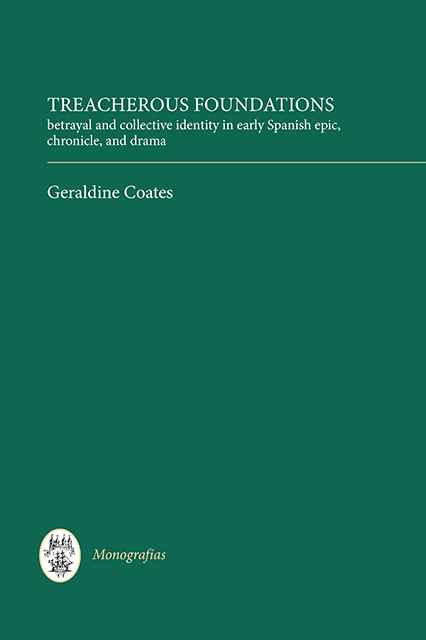 Treacherous Foundations
Treacherous Foundations Published online by Cambridge University Press: 07 March 2023
For our wrestling is not against flesh and blood; but against principalities and powers
(Ephesians 6.10-20)Treachery and the Meaning of Loss
The waves of unification and expansion that shaped the geography of thirteenth-century Iberia created an imaginative setting for its literature. The Poema de Fernán González, whether written at the end of the triumphant phase of reconquest by Ferdinand III, or during the reign of his son Alfonso X, foregrounds the theme of growth and conquest. Announcing its business as that of telling ‘commo cobro s’la tierra toda de mar a mar’ (2d), the poem concedes that a tale of loss must come first, ‘Contar vos primero de commo la perdieron’ (3a). Implicit in this caveat is that the ideology of gain in the poem, expressed as cobrar, is in fact one of re-gain, and so it always incorporates the experience of loss. Proof lies in language as much as theme; gain and loss are pressed tightly together from the outset of the poem by the recurrence of the phrase ‘perdiendo e cobrando’.
Even in its triumphant first lines, the Poema alludes to ‘coita’ (3b, 4a), the condition of abjection following territorial dispossession. It is a combination of despair and deprivation of epic proportions, ‘muchos malos espantos, muchos malos sabores’ (4b), ‘frio e fanbre e muchos amargores’ (4c). Julian Weiss has discussed in detail the concept of coita in the Poema; he describes it as connoting ‘the shame of being leaderless, landless, afraid, without food or shelter’ (144), ‘suffering shorn of desire’ (145). Of much interest to the study in hand, he adds that it conveys ‘betrayal of destiny and contamination of bloodlines’; ‘betrayal of the past, and contamination of the future’ (144-45).4 As a chaotic medley of loss and despair, coita is indeed inherently linked with treachery in the poem:
Fijos de Vautiçanos no devieran nasçer, que essos començaron traiçion a fazer: volvio lo el diablo, metio y su poder: esto fue el escomienço de España perder. (41)
After stating definitively that treachery in the genealogical line of Witiza provoked the loss of Spain, the poet provides a second, more emphatic description of coita. It is represented again as a state of immense fear and hunger, but with added diabolical woes: slaughter, persecution, and even cannibalism.
To save this book to your Kindle, first ensure [email protected] is added to your Approved Personal Document E-mail List under your Personal Document Settings on the Manage Your Content and Devices page of your Amazon account. Then enter the ‘name’ part of your Kindle email address below. Find out more about saving to your Kindle.
Note you can select to save to either the @free.kindle.com or @kindle.com variations. ‘@free.kindle.com’ emails are free but can only be saved to your device when it is connected to wi-fi. ‘@kindle.com’ emails can be delivered even when you are not connected to wi-fi, but note that service fees apply.
Find out more about the Kindle Personal Document Service.
To save content items to your account, please confirm that you agree to abide by our usage policies. If this is the first time you use this feature, you will be asked to authorise Cambridge Core to connect with your account. Find out more about saving content to Dropbox.
To save content items to your account, please confirm that you agree to abide by our usage policies. If this is the first time you use this feature, you will be asked to authorise Cambridge Core to connect with your account. Find out more about saving content to Google Drive.